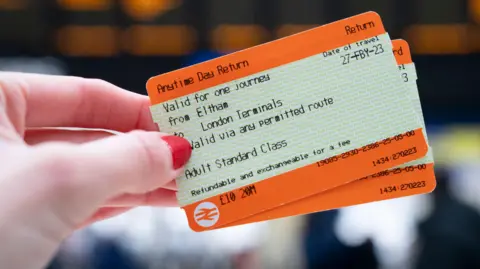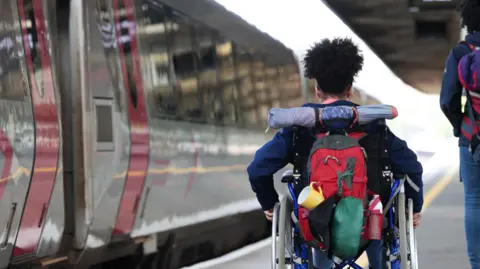ARTICLE AD BOX

 PA Media
PA Media
Regulated train fares in England are to increase by 4.6% next year, while the price of most railcards will rise by £5, the government has announced.
The increases were not mentioned by the chancellor in her Budget speech to the House of Commons earlier on Wednesday, but it was instead noted in the Treasury's budget document.
The changes will come into force on 2 March 2025.
Elsewhere in the Budget, Chancellor Rachel Reeves set out tax increases worth £40bn in a bid to repair public finances and promised billions of extra spending on schools and the NHS.
Around 45% of rail fares are regulated by the government in England, Wales and Scotland - but the rise only directly relates to travel in England.
Regulated fares include season tickets covering most commuter routes, some off-peak return tickets on long-distance journeys and flexible tickets for travel in and around major cities.
Train operators are free to set prices for unregulated fares, but they typically rise by similar amounts.
The Treasury said the 4.6% increase to regulated rail fares in 2025 was one percentage point above July's Retail Prices Index (RPI) measure of inflation.
The government said: "It's the lowest absolute increase in three years."
It added that the £5 rise in the cost of railcards - which provide discounts for different groups of people - would be subject to an industry review. Most generally cost £30 per year.
Holders of the Disabled Persons Railcard will not be affected, the government said.
It added that railcards save users an average of "up to £158" annually.
However, the Campaign for Better Transport said raising rail fares above inflation and increasing the cost of railcards was a "kick in the teeth" for people who rely on public transport, particularly those on low incomes.
The group said: "Doing this at the same time as keeping fuel duty frozen sends entirely the wrong message.
"To tackle air pollution, congestion and climate change, we need to make public transport the attractive, affordable choice."
Meanwhile, Rail Partners, a group representing private rail organisations, argued the government's focus must be on growing passenger numbers, not making current passengers pay more.

 Getty Images
Getty Images
The price of disabled railcards will not be affected by the planned £5 increase
Its chief executive Andy Bagnall said: "Government should set fares at a level that will ultimately encourage more people to travel by train in the future, helping to secure the long-term financial sustainability of the sector and capture the wider economic and environmental benefits of rail for the nation as a whole.
"The focus must be on growing passenger numbers, not making current passengers pay more."
Other measures announced in Wednesday's budget included increases to the basic rates of capital gains tax, upping the proportion of National Insurance contributions businesses have to pay, and a rise in the cap on single bus fares from £2 to £3.
Reeves also raised the minimum wage, maintained a 5p cut to fuel duty for another year and made several commitments to finance rail infrastructure - including the stretch of HS2 running into London's Euston station.
Conservative leader Rishi Sunak said that "never in the history of our country will taxes be higher than they are under this Labour government".
He also said it was "nonsense" to suggest Labour inherited difficult circumstances, after Reeves accused the Tories of leaving a £22bn "black hole" in the public finances.

 7 months ago
33
7 months ago
33








 English (US) ·
English (US) ·